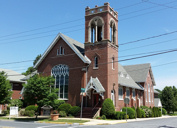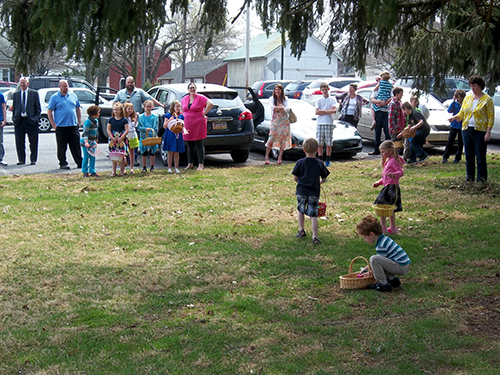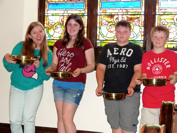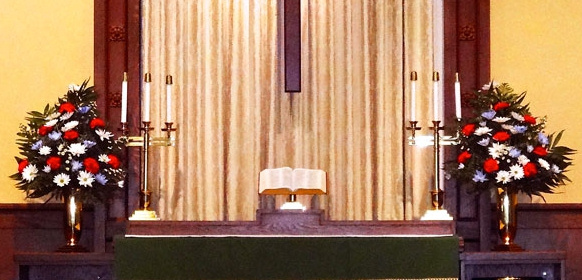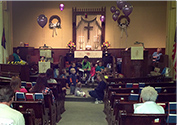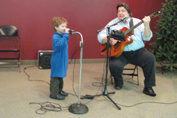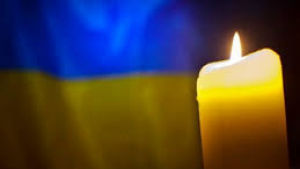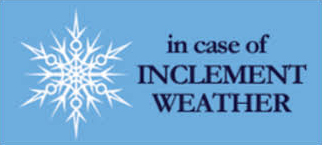About the UCC
Welcome to the United Church of Christ
Origins of the United Church of Christ
Characteristics of the United Church of Christ
UCC Motto - that they may all be one (John 17:21)
More About the United Church of Christ
Watch an United Church of Christ Welcome Video
Pennsylvania Southeast Conference - PSEC
Welcome
Welcome to the United Church of Christ—a community of faith that seeks to respond to the Gospel of Jesus Christ in word and deed. The UCC was founded in 1957 as the union of several different Christian traditions: from the beginning of our history, we were a church that affirmed the ideal that Christians did not always have to agree to live together in communion. Our motto—"that they may all be one"—is Jesus' prayer for the unity of the church (John 17:21). The UCC is one of the most diverse Christian denominations in the United States. We hope you'll join us.
Origins of the United Church of Christ
The United Church of Christ came into being in 1957 with the union of two Protestant denominations: the Evangelical and Reformed Church and the Congregational Christian Churches. Each of these was, in turn, the result of a union of two earlier traditions.
The Congregational Churches
 The Congregational Churches were organized when the Pilgrims of Plymouth Plantation (1620) and the Puritans of the Massachusetts Bay Colony (1629) acknowledged their essential unity in the Cambridge Platform of 1648.
The Congregational Churches were organized when the Pilgrims of Plymouth Plantation (1620) and the Puritans of the Massachusetts Bay Colony (1629) acknowledged their essential unity in the Cambridge Platform of 1648.
The Reformed Church
 The Reformed Church in the United States traced its beginnings to congregations of German settlers in Pennsylvania founded from 1725 on. Later, its ranks were swelled by Reformed immigrants from Switzerland, Hungary and other countries. [St. Paul's UCC in Robesonia grew from this branch of the UCC, which you can read more about by clicking on this History of St. Paul's UCC link].
The Reformed Church in the United States traced its beginnings to congregations of German settlers in Pennsylvania founded from 1725 on. Later, its ranks were swelled by Reformed immigrants from Switzerland, Hungary and other countries. [St. Paul's UCC in Robesonia grew from this branch of the UCC, which you can read more about by clicking on this History of St. Paul's UCC link].
The Christian Churches
 The Christian Churches sprang up in the late 1700s and early 1800s in reaction to the theological and organizational rigidity of the Methodist, Presbyterian and Baptist churches of the time.
The Christian Churches sprang up in the late 1700s and early 1800s in reaction to the theological and organizational rigidity of the Methodist, Presbyterian and Baptist churches of the time.
The Evangelical Synod of North America
 The Evangelical Synod of North America traced its beginnings to an association of German Evangelical pastors in Missouri. This association, founded in 1841, reflected the 1817 union of Lutheran and Reformed churches in Germany.
The Evangelical Synod of North America traced its beginnings to an association of German Evangelical pastors in Missouri. This association, founded in 1841, reflected the 1817 union of Lutheran and Reformed churches in Germany.
...and more
 Through the years, other groups such as American Indians, Afro-Christians, Asian Americans, Pacific Islanders, Volga Germans, Armenians, and Hispanic Americans have joined with the four earlier groups. In recent years, Christians from other traditions, including the Roman Catholic Church, have found a home in the UCC, and so have gay and lesbian Christians who have not been welcome in other churches. Thus the United Church of Christ celebrates and continues a broad variety of traditions in its common life.
Through the years, other groups such as American Indians, Afro-Christians, Asian Americans, Pacific Islanders, Volga Germans, Armenians, and Hispanic Americans have joined with the four earlier groups. In recent years, Christians from other traditions, including the Roman Catholic Church, have found a home in the UCC, and so have gay and lesbian Christians who have not been welcome in other churches. Thus the United Church of Christ celebrates and continues a broad variety of traditions in its common life.
Characteristics of the United Church of Christ
The characteristics of the United Church of Christ can be summarized in part by the key words in the names that formed our union: Christian, Reformed, Congregational, Evangelical.
Christian
 Christian. By our very name, the United Church of Christ, we declare ourselves to be part of the Body of Christ—the Christian church. We continue the witness of the early disciples to the reality and power of the crucified and risen Christ, Jesus of Nazareth.
Christian. By our very name, the United Church of Christ, we declare ourselves to be part of the Body of Christ—the Christian church. We continue the witness of the early disciples to the reality and power of the crucified and risen Christ, Jesus of Nazareth.
Reformed
 Reformed. All four denominations arose from the tradition of the Protestant Reformers: We confess the authority of one God. We affirm the primacy of the Scriptures, the doctrine of justification by faith, the priesthood of all believers, and the principle of Christian freedom. We celebrate two sacraments: baptism and the Lord's Supper (also called Holy Communion or the Eucharist).
Reformed. All four denominations arose from the tradition of the Protestant Reformers: We confess the authority of one God. We affirm the primacy of the Scriptures, the doctrine of justification by faith, the priesthood of all believers, and the principle of Christian freedom. We celebrate two sacraments: baptism and the Lord's Supper (also called Holy Communion or the Eucharist).
Congregational
 Congregational. The basic unit of the United Church of Christ is the congregation. Members of each congregation covenant with one another and with God as revealed in Jesus Christ and empowered by the Holy Spirit. These congregations, in turn, exist in covenantal relationships with one another to form larger structures for more effective work. Our covenanting emphasizes trustful relationships rather than legal agreements.
Congregational. The basic unit of the United Church of Christ is the congregation. Members of each congregation covenant with one another and with God as revealed in Jesus Christ and empowered by the Holy Spirit. These congregations, in turn, exist in covenantal relationships with one another to form larger structures for more effective work. Our covenanting emphasizes trustful relationships rather than legal agreements.
Evangelical
 Evangelical. The primary task of the church is the proclamation of the Gospel or (in Greek) evangel. The Gospel literally means the "Good News" of God's love revealed with power in Jesus Christ. We proclaim this Gospel by word and deed to individual persons and to society. This proclamation is the heart of the leiturgia—in Greek, the "work of the people" in daily and Sunday worship. We gather for the worship of God, and through each week, we engage in the service of humankind.
Evangelical. The primary task of the church is the proclamation of the Gospel or (in Greek) evangel. The Gospel literally means the "Good News" of God's love revealed with power in Jesus Christ. We proclaim this Gospel by word and deed to individual persons and to society. This proclamation is the heart of the leiturgia—in Greek, the "work of the people" in daily and Sunday worship. We gather for the worship of God, and through each week, we engage in the service of humankind.
What We Believe
We can tell you more about the United Church of Christ with the help of seven phrases from Scripture and Tradition which express our commitments.
Motto
 That they may all be one. [John 17:21] This motto of the United Church of Christ reflects the spirit of unity on which it is based and points toward future efforts to heal the divisions in the body of Christ. We are a uniting church as well as a united church.
That they may all be one. [John 17:21] This motto of the United Church of Christ reflects the spirit of unity on which it is based and points toward future efforts to heal the divisions in the body of Christ. We are a uniting church as well as a united church.
Unity in Diversity with Charity
 In essentials unity, in non-essentials diversity, in all things charity. The unity that we seek requires neither an uncritical acceptance of any point of view, nor rigid formulation of doctrine. It does require mutual understanding and agreement as to which aspects of the Christian faith and life are essential.
In essentials unity, in non-essentials diversity, in all things charity. The unity that we seek requires neither an uncritical acceptance of any point of view, nor rigid formulation of doctrine. It does require mutual understanding and agreement as to which aspects of the Christian faith and life are essential.
The unity of the church is not of its own making. It is a gift of God. But expressions of that unity are as diverse as there are individuals. The common thread that runs through all is love.
Testimonies of Faith
 Testimonies of faith rather than tests of faith. Because faith can be expressed in many different ways, the United Church of Christ has no formula that is a test of faith. Down through the centuries, however, Christians have shared their faith with one another through creeds, confessions, catechisms and other statements of faith. Historic statements such as the Apostles' Creed, the Nicene Creed, the Heidelberg Catechism, the Evangelical Catechism, the Augsburg Confession, the Cambridge Platform and the Kansas City Statement of Faith are valued in our church as authentic testimonies of faith. [See Beliefs for the complete texts of some of these testimonies.] In 1959, the General Synod of the United Church of Christ adopted a Statement of Faith prepared especially for congregations of the United Church. Many of us use this statement as a common affirmation of faith in worship and as a basis for study.
Testimonies of faith rather than tests of faith. Because faith can be expressed in many different ways, the United Church of Christ has no formula that is a test of faith. Down through the centuries, however, Christians have shared their faith with one another through creeds, confessions, catechisms and other statements of faith. Historic statements such as the Apostles' Creed, the Nicene Creed, the Heidelberg Catechism, the Evangelical Catechism, the Augsburg Confession, the Cambridge Platform and the Kansas City Statement of Faith are valued in our church as authentic testimonies of faith. [See Beliefs for the complete texts of some of these testimonies.] In 1959, the General Synod of the United Church of Christ adopted a Statement of Faith prepared especially for congregations of the United Church. Many of us use this statement as a common affirmation of faith in worship and as a basis for study.
God is Still Speaking
 There is yet more light and truth to break forth from God's Holy Word. This affirmation by one of the founders of the Congregational tradition assumes the primacy of the Bible as a source for understanding the Good News and as a foundation for all statements of faith. It recognizes that the Bible, though written in specific historical times and places, still speaks to us in our present condition. It declares that the study of the scriptures is not limited by past interpretations, but it is pursued with the expectation of new insights and God's help for living today.
There is yet more light and truth to break forth from God's Holy Word. This affirmation by one of the founders of the Congregational tradition assumes the primacy of the Bible as a source for understanding the Good News and as a foundation for all statements of faith. It recognizes that the Bible, though written in specific historical times and places, still speaks to us in our present condition. It declares that the study of the scriptures is not limited by past interpretations, but it is pursued with the expectation of new insights and God's help for living today.
Priesthood of All Believers
 The Priesthood of All Believers. All members of the United Church of Christ are called to minister to others and to participate as equals in the common worship of God, each with direct access to the mercies of God through personal prayer and devotion.
The Priesthood of All Believers. All members of the United Church of Christ are called to minister to others and to participate as equals in the common worship of God, each with direct access to the mercies of God through personal prayer and devotion.
We believe that we as individuals can and should pray directly to God. We believe that we can and should pray with and for one another. We believe that we can and should study Biblical scripture both individually and together with fellow believers, and share scripture with others beyond the Christian faith (see the above evangelical nature of our faith). We have the responsibility and privilege to help one another grow in our loving relationship with our living God, to grow in our Christian discipleship, and to welcome and lead others in their growth as discipes of Christ.
Recognition is given to those among us who have received special training in pastoral, priestly, educational and administrative functions, but these persons are regarded as servants—rather than as persons in authority. Their task is to guide, to instruct, to enable the ministry of all Christians rather than to do the work of ministry for us. We use the term "pastor", "chaplain", or "authorized minister" rather than "priest" to refer to these individuals, for all of us who have been baptized into the discipleship of Jesus Christ have been baptized into the "Priesthood of All Believers" -- meaning all of us, in this sense of the word, are "priests."
Responsible Freedom
 Responsible Freedom. As individual members of the Body of Christ, we are free to believe and act in accordance with our perception of God's will for our lives. But we are called to live in a loving, covenantal relationship with one another—gathering in communities of faith, congregations of believers, local churches.
Responsible Freedom. As individual members of the Body of Christ, we are free to believe and act in accordance with our perception of God's will for our lives. But we are called to live in a loving, covenantal relationship with one another—gathering in communities of faith, congregations of believers, local churches.
Each congregation or local church is free to act in accordance with the collective decision of its members, guided by the working of the Spirit in the light of the scriptures. But it also is called to live in a covenantal relationship with other congregations for the sharing of insights and for cooperative action under the authority of Christ.
Likewise, associations of churches, conferences, the General Synod and the churchwide "covenanted ministries" of the United Church of Christ are free to act in their particular spheres of responsibility. Yet all are constrained by love to live in a covenantal relationship with one another and with the local churches in order to make manifest the unity of the body of Christ and thus to carry out God's mission in the world more effectively.
The members, congregations, associations, conferences, General Synod, and covenanted ministries are free in relation to the world. We affirm that the authority of God as revealed in Jesus Christ and interpreted with the aid of the Holy Spirit stands above and judges all human culture, institutions and laws. But we recognize our calling both as individuals and as the church to live in the world:
 To proclaim in word and action the Gospel of Jesus Christ.
To proclaim in word and action the Gospel of Jesus Christ.
 To work for reconciliation and the unity of the broken Body of Christ.
To work for reconciliation and the unity of the broken Body of Christ.
 To minister to the needs of the world.
To minister to the needs of the world.
 To contribute to the welfare of all.
To contribute to the welfare of all.
 To seek justice and liberation for all.
To seek justice and liberation for all.
This is the challenge of the United Church of Christ.
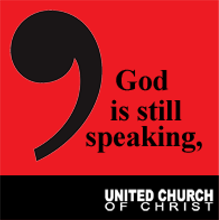 While preserving relevant portions of heritage and history dating back to the 16th century, the UCC and its forebears have proven themselves capable of moving forward, tying faith to social justice and shaping cutting edge theology and service in an ever-changing world. Affirming that Jesus Christ is the Head of the Church, the UCC claims as its own the faith of the historic church expressed in the ancient creeds and reclaimed in the basic insights of the Protestant reformers. Yet the UCC also affirms the responsibility of the church in each generation and community to make faith its own in reality of worship, in honesty of thought and expression, and in purity of heart before God. It looks to the Word of God in the Scriptures, and to the presence and power of the Holy Spirit to prosper its creative and redemptive work in the world. One of the UCC's distinguishing characteristics is its penchant to believe that ... God is still speaking, ... even when it puts us out there alone. History has shown that, most often, we're only alone for a while. Join us!
While preserving relevant portions of heritage and history dating back to the 16th century, the UCC and its forebears have proven themselves capable of moving forward, tying faith to social justice and shaping cutting edge theology and service in an ever-changing world. Affirming that Jesus Christ is the Head of the Church, the UCC claims as its own the faith of the historic church expressed in the ancient creeds and reclaimed in the basic insights of the Protestant reformers. Yet the UCC also affirms the responsibility of the church in each generation and community to make faith its own in reality of worship, in honesty of thought and expression, and in purity of heart before God. It looks to the Word of God in the Scriptures, and to the presence and power of the Holy Spirit to prosper its creative and redemptive work in the world. One of the UCC's distinguishing characteristics is its penchant to believe that ... God is still speaking, ... even when it puts us out there alone. History has shown that, most often, we're only alone for a while. Join us!
We receive many gifts from our ecumenical partners, being "early" seems to be one of ours. Intelligent dialogue and a strong independent streak sometimes cause the United Church of Christ (UCC) and its 1.2 million members to be called a “heady and exasperating mix.” The UCC tends to be a mostly progressive denomination that unabashedly engages heart and mind. And yet, the UCC somehow manages to balance congregational autonomy with a strong commitment to unity among its nearly 5,600 congregations—despite wide differences among many local congregations on a variety of issues.
The United Church of Christ came into being in 1957 with the union of two Protestant denominations: the Evangelical and Reformed Church and the Congregational Christian Churches. Each of these was, in turn, the result of a union of two earlier traditions.
 The Congregational Churches were organized when the Pilgrims of Plymouth Plantation (1620) and the Puritans of the Massachusetts Bay Colony (1629) acknowledged their essential unity in the Cambridge Platform of 1648.
The Congregational Churches were organized when the Pilgrims of Plymouth Plantation (1620) and the Puritans of the Massachusetts Bay Colony (1629) acknowledged their essential unity in the Cambridge Platform of 1648.
 The Reformed Church in the United States traced its beginnings to congregations of German settlers in Pennsylvania founded from 1725 on. Later, its ranks were swelled by Reformed immigrants from Switzerland, Hungary and other countries.
The Reformed Church in the United States traced its beginnings to congregations of German settlers in Pennsylvania founded from 1725 on. Later, its ranks were swelled by Reformed immigrants from Switzerland, Hungary and other countries.
 The Christian Churches sprang up in the late 1700s and early 1800s in reaction to the theological and organizational rigidity of the Methodist, Presbyterian and Baptist churches of the time.
The Christian Churches sprang up in the late 1700s and early 1800s in reaction to the theological and organizational rigidity of the Methodist, Presbyterian and Baptist churches of the time.
 The Evangelical Synod of North America traced its beginnings to an association of German Evangelical pastors in Missouri. This association, founded in 1841, reflected the 1817 union of Lutheran and Reformed churches in Germany.
The Evangelical Synod of North America traced its beginnings to an association of German Evangelical pastors in Missouri. This association, founded in 1841, reflected the 1817 union of Lutheran and Reformed churches in Germany.
 Through the years, other groups such as American Indians, Afro-Christians, Asian Americans, Pacific Islanders, Volga Germans, Armenians, and Hispanic Americans have joined with the four earlier groups. In recent years, Christians from other traditions, including the Roman Catholic Church, have found a home in the UCC, and so have gay and lesbian Christians who have not been welcome in other churches. Thus the United Church of Christ celebrates and continues a broad variety of traditions in its common life.
Through the years, other groups such as American Indians, Afro-Christians, Asian Americans, Pacific Islanders, Volga Germans, Armenians, and Hispanic Americans have joined with the four earlier groups. In recent years, Christians from other traditions, including the Roman Catholic Church, have found a home in the UCC, and so have gay and lesbian Christians who have not been welcome in other churches. Thus the United Church of Christ celebrates and continues a broad variety of traditions in its common life.
Characteristics of the United Church of Christ
The characteristics of the United Church of Christ can be summarized in part by the key words in the names that formed our union: Christian, Reformed, Congregational, Evangelical.
 Christian. By our very name, the United Church of Christ, we declare ourselves to be part of the Body of Christ—the Christian church. We continue the witness of the early disciples to the reality and power of the crucified and risen Christ, Jesus of Nazareth.
Christian. By our very name, the United Church of Christ, we declare ourselves to be part of the Body of Christ—the Christian church. We continue the witness of the early disciples to the reality and power of the crucified and risen Christ, Jesus of Nazareth.
 Reformed. All four denominations arose from the tradition of the Protestant Reformers: We confess the authority of one God. We affirm the primacy of the Scriptures, the doctrine of justification by faith, the priesthood of all believers, and the principle of Christian freedom. We celebrate two sacraments: baptism and the Lord's Supper (also called Holy Communion or the Eucharist).
Reformed. All four denominations arose from the tradition of the Protestant Reformers: We confess the authority of one God. We affirm the primacy of the Scriptures, the doctrine of justification by faith, the priesthood of all believers, and the principle of Christian freedom. We celebrate two sacraments: baptism and the Lord's Supper (also called Holy Communion or the Eucharist).
 Congregational. The basic unit of the United Church of Christ is the congregation. Members of each congregation covenant with one another and with God as revealed in Jesus Christ and empowered by the Holy Spirit. These congregations, in turn, exist in covenantal relationships with one another to form larger structures for more effective work. Our covenanting emphasizes trustful relationships rather than legal agreements.
Congregational. The basic unit of the United Church of Christ is the congregation. Members of each congregation covenant with one another and with God as revealed in Jesus Christ and empowered by the Holy Spirit. These congregations, in turn, exist in covenantal relationships with one another to form larger structures for more effective work. Our covenanting emphasizes trustful relationships rather than legal agreements.
 Evangelical. The primary task of the church is the proclamation of the Gospel or (in Greek) evangel. The Gospel literally means the "Good News" of God's love revealed with power in Jesus Christ. We proclaim this Gospel by word and deed to individual persons and to society. This proclamation is the heart of the leiturgia—in Greek, the "work of the people" in daily and Sunday worship. We gather for the worship of God, and through each week, we engage in the service of humankind.
Evangelical. The primary task of the church is the proclamation of the Gospel or (in Greek) evangel. The Gospel literally means the "Good News" of God's love revealed with power in Jesus Christ. We proclaim this Gospel by word and deed to individual persons and to society. This proclamation is the heart of the leiturgia—in Greek, the "work of the people" in daily and Sunday worship. We gather for the worship of God, and through each week, we engage in the service of humankind.
What we believe
We can tell you more about the United Church of Christ with the help of seven phrases from Scripture and Tradition which express our commitments.
 That they may all be one. [John 17:21] This motto of the United Church of Christ reflects the spirit of unity on which it is based and points toward future efforts to heal the divisions in the body of Christ. We are a uniting church as well as a united church.
That they may all be one. [John 17:21] This motto of the United Church of Christ reflects the spirit of unity on which it is based and points toward future efforts to heal the divisions in the body of Christ. We are a uniting church as well as a united church.
 In essentials unity, in non-essentials diversity, in all things charity. The unity that we seek requires neither an uncritical acceptance of any point of view, nor rigid formulation of doctrine. It does require mutual understanding and agreement as to which aspects of the Christian faith and life are essential.
In essentials unity, in non-essentials diversity, in all things charity. The unity that we seek requires neither an uncritical acceptance of any point of view, nor rigid formulation of doctrine. It does require mutual understanding and agreement as to which aspects of the Christian faith and life are essential.
 The unity of the church is not of its own making. It is a gift of God. But expressions of that unity are as diverse as there are individuals. The common thread that runs through all is love.
The unity of the church is not of its own making. It is a gift of God. But expressions of that unity are as diverse as there are individuals. The common thread that runs through all is love.
 Testimonies of faith rather than tests of faith. Because faith can be expressed in many different ways, the United Church of Christ has no formula that is a test of faith. Down through the centuries, however, Christians have shared their faith with one another through creeds, confessions, catechisms and other statements of faith. Historic statements such as the Apostles' Creed, the Nicene Creed, the Heidelberg Catechism, the Evangelical Catechism, the Augsburg Confession, the Cambridge Platform and the Kansas City Statement of Faith are valued in our church as authentic testimonies of faith. [See Beliefs for the complete texts of some of these testimonies.] In 1959, the General Synod of the United Church of Christ adopted a Statement of Faith prepared especially for congregations of the United Church. Many of us use this statement as a common affirmation of faith in worship and as a basis for study.
Testimonies of faith rather than tests of faith. Because faith can be expressed in many different ways, the United Church of Christ has no formula that is a test of faith. Down through the centuries, however, Christians have shared their faith with one another through creeds, confessions, catechisms and other statements of faith. Historic statements such as the Apostles' Creed, the Nicene Creed, the Heidelberg Catechism, the Evangelical Catechism, the Augsburg Confession, the Cambridge Platform and the Kansas City Statement of Faith are valued in our church as authentic testimonies of faith. [See Beliefs for the complete texts of some of these testimonies.] In 1959, the General Synod of the United Church of Christ adopted a Statement of Faith prepared especially for congregations of the United Church. Many of us use this statement as a common affirmation of faith in worship and as a basis for study.
 There is yet more light and truth to break forth from God's holy word. This affirmation by one of the founders of the Congregational tradition assumes the primacy of the Bible as a source for understanding the Good News and as a foundation for all statements of faith. It recognizes that the Bible, though written in specific historical times and places, still speaks to us in our present condition. It declares that the study of the scriptures is not limited by past interpretations, but it is pursued with the expectation of new insights and God's help for living today.
There is yet more light and truth to break forth from God's holy word. This affirmation by one of the founders of the Congregational tradition assumes the primacy of the Bible as a source for understanding the Good News and as a foundation for all statements of faith. It recognizes that the Bible, though written in specific historical times and places, still speaks to us in our present condition. It declares that the study of the scriptures is not limited by past interpretations, but it is pursued with the expectation of new insights and God's help for living today.
 The Priesthood of All Believers. All members of the United Church of Christ are called to minister to others and to participate as equals in the common worship of God, each with direct access to the mercies of God through personal prayer and devotion.
The Priesthood of All Believers. All members of the United Church of Christ are called to minister to others and to participate as equals in the common worship of God, each with direct access to the mercies of God through personal prayer and devotion.
Recognition is given to those among us who have received special training in pastoral, priestly, educational and administrative functions, but these persons are regarded as servants—rather than as persons in authority. Their task is to guide, to instruct, to enable the ministry of all Christians rather than to do the work of ministry for us.
 Responsible Freedom. As individual members of the Body of Christ, we are free to believe and act in accordance with our perception of God's will for our lives. But we are called to live in a loving, covenantal relationship with one another—gathering in communities of faith, congregations of believers, local churches.
Responsible Freedom. As individual members of the Body of Christ, we are free to believe and act in accordance with our perception of God's will for our lives. But we are called to live in a loving, covenantal relationship with one another—gathering in communities of faith, congregations of believers, local churches.
Each congregation or local church is free to act in accordance with the collective decision of its members, guided by the working of the Spirit in the light of the scriptures. But it also is called to live in a covenantal relationship with other congregations for the sharing of insights and for cooperative action under the authority of Christ.
Likewise, associations of churches, conferences, the General Synod and the churchwide "covenanted ministries" of the United Church of Christ are free to act in their particular spheres of responsibility. Yet all are constrained by love to live in a covenantal relationship with one another and with the local churches in order to make manifest the unity of the body of Christ and thus to carry out God's mission in the world more effectively.
The members, congregations, associations, conferences, General Synod, and covenanted ministries are free in relation to the world. We affirm that the authority of God as revealed in Jesus Christ and interpreted with the aid of the Holy Spirit stands above and judges all human culture, institutions and laws. But we recognize our calling both as individuals and as the church to live in the world:
 To proclaim in word and action the Gospel of Jesus Christ.
To proclaim in word and action the Gospel of Jesus Christ. To work for reconciliation and the unity of the broken Body of Christ.
To work for reconciliation and the unity of the broken Body of Christ. To seek justice and liberation for all.
To seek justice and liberation for all.
This is the challenge of the United Church of Christ.
